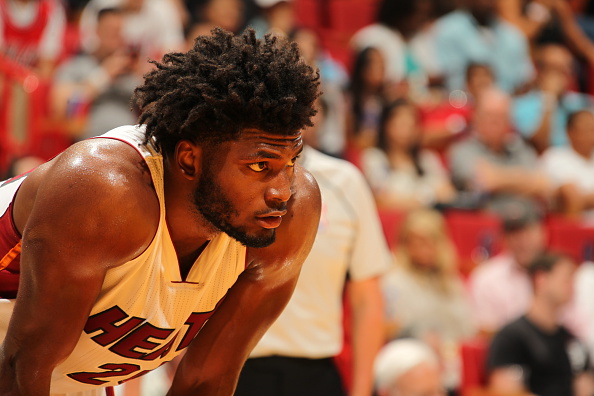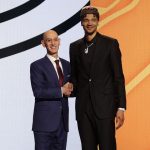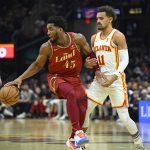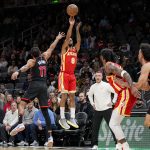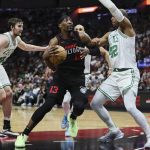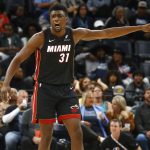The second season of Miami Heat forward Justise Winslow came to an abrupt end in January, when shoulder surgery put him on the shelf for the rest of the season. His potential contributions during what became a strong regular-season run that ultimately fell short can only be speculated, yet they give hope that his offseason work will help return the team to the postseason in 2018.
“I’m ready. I’ve sat out long enough. Now I have 5 1/2 more months. It’s been a good process for me, especially just maturing and growing as a person and as a player even though I’m not on the court,” Winslow said. “I’m a little bit ahead of schedule. Range of motion [in the shoulder] is pretty good. I am satisfied with the progress. Only thing I haven’t done, as far as shooting the basketball, is right hand layups, right hand finishes.”
Winslow, who only turned 21 last month, had also battled a wrist injury, which caused his three-point development to stall out. Heat head coach Erik Spoelstra spoke on Monday about how the injuries to both Winslow and Josh Richardson proved to be costly to the team:
“If Winslow had been able to play a full season, [he] would have had a major impact on this team. I thought he had a terrific summer, along with J-Rich (Richardson),” Spoelstra said. “Everybody you talk to coming out of Orlando, they were two of the top players coming out of the Summer League. People were really commenting, ‘They followed up an impressive rookie year with a great summer league. Not good, but great summer league.’
“And then a full summer of development. Both were ready to make that next jump. And both got hurt, unfortunately. I haven’t forgotten the potential and what we can build on this summer,” Spoelstra said. “Justise brings a tremendous amount of versatility, of defense, of toughness, of winning plays, of things we emphasize. Justise fills in a lot of those intangible gaps; he knows how to impact winning. That certainly could have made an impact.”
As a rookie, Winslow connected on 42.2 percent of his field-goal attempts, but dipped to 35.6 this past season due to his wrist problem. Overall, his injury-plagued season saw him play in just 18 games, 15 of those coming as a starter. In those contests, he averaged 10.9 points, 5.2 rebounds and 3.7 assists per game.
Yet Spoelstra is more concerned about Winslow’s overall game, as opposed to zeroing in on his scoring potential or ability beyond the three-point line:
[xyz-ihs snippet=”Responsive-Image-Only”]
“I don’t want the focus on how many threes he makes. He will make enough. He is dedicated enough to work on them. It will be about getting into world class shape, getting healthy so he can make all the plays he needs that impact and help your team win,” Spoelstra said. “It will be my job to put him in spots where he can be efficient and find small victories and build on those right away. Particularly if he didn’t have the wrist injury, he would have been an efficient offensive player. It might have looked differently than people would have wanted it to be.
“He will find a way to help your team. We would have found a way to put him into his strengths and build on some of the weaknesses. His weaknesses, whatever the perceived ones are, will not be our focus this summer. It will be his strengths and being in world class upper echelon shape and health will be the priority.”
Spoelstra isn’t necessarily steering Winslow away from his three-point development, but hopes that his versatility on defense doesn’t take a back seat.
“He can create that game,” Spoelstra said. “People get caught up in so much of the wrong narrative. We are not trying to develop Justise Winslow to become Chris Mullin. Totally different basketball player. If you want to talk about three-and-D, one thing he can do is impact defensively and take away threes because of his ability to defend one through five and that’s unique in this league.
“He can generate threes for you offensively because he puts a lot of pressure in the paint, off the dribble, in transition. He’s an aggressive, bruising, physical type of player and he sees the floor. That helps create your three-point game.”
The aforementioned wrist injury resulted in Winslow making just 20 percent of his 35 attempts from long-range this season. Those results came after working last summer with the team’s shooting coach Rob Fodor.
“It held me back a little bit,” Winslow said. “It bothered me a little bit but you really can’t make excuses because everyone is going through it.”
Of course, Winslow’s potential doesn’t guarantee him a starting slot next season, especially since he’s still three months away from full recovery from his shoulder surgery and that’s perfectly okay with him.
“I love challenges. I don’t want an easy route. I don’t think anyone wants an easy route. Easy routes aren’t fun. Just go out there and fight for what you want.”
[xyz-ihs snippet=”Responsive-ImagenText”]
